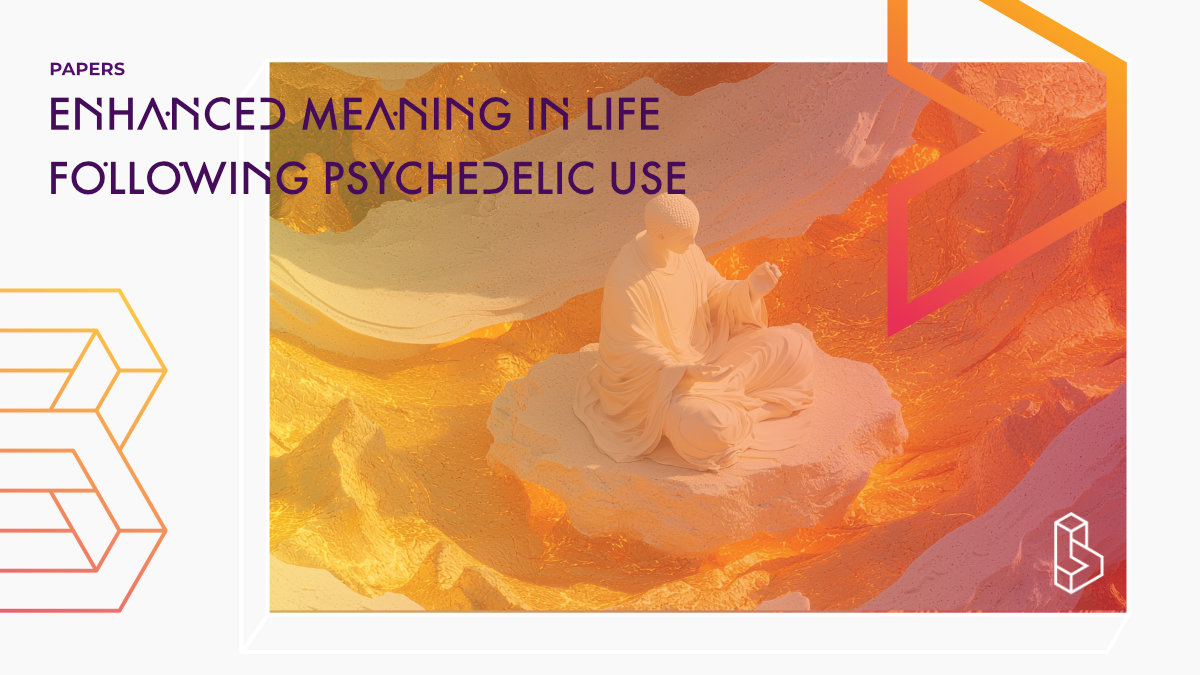This mixed-methods analysis (n=973 across multiple cohorts) examines how psychedelic experiences influence “meaning in life” using the Meaning in Life Questionnaire (MLQ) across three contexts: a psilocybin clinical trial for depression, a single-arm healthy volunteer study, and a naturalistic retreat-based study. It finds strong increases in the “presence of meaning” subscale and modest decreases in “search for meaning,” with enhancements linked to improvements in mental health and to the intensity of mystical, ego-dissolution, and emotional breakthrough experiences.
Abstract of Enhanced meaning in life following psychedelic use
“Introduction: Psychedelics, such as psilocybin, are increasingly recognized for their propensity to elicit powerful subjective experiences that carry personal meaning. While research has demonstrated the capacity for these compounds to promote psychological wellbeing, it has yet to be shown to what extent they modulate “meaning in life”, a specific contributor to mental and physical health.
Methods: Using the Meaning in Life Questionnaire (MLQ), we examined changes in meaning in life occurring across three different contexts of psychedelic use, including a randomized clinical trial of psilocybin for depression, controlled administration of psilocybin in a single-arm healthy volunteer study, and a naturalistic observational study following participants in psychedelic retreats. Meaning in life changes were analyzed with linear mixed models, and relationships to other predictors and outcomes were examined via Pearson correlations.
Results: Across all contexts, the sub-factor “presence of meaning” was strongly increased after a psychedelic experience, while the sub-factor “search for meaning” was only weakly reduced. Enhancements of meaning in life were also moderately correlated with changes in measures of mental health, including mental wellbeing and depression severity. In line with previous research, we found that mystical, ego dissolution and emotional breakthrough experiences were correlated with an increase of meaning in life, with context-dependent differences in the strength of the association.
Discussion: The convergence of evidence from multiple studies shows that psychedelic use has a robust and long-lasting positive effect on meaning in life. We explore potential mechanisms of psychedelic-induced meaning enhancement and highlight the possible influences of psychosocial context on outcomes.“
Authors: William Roseby, Hannes Kettner, Leor Roseman, Meg J. Spriggs, Taylor Lyons, Joe Peill, Bruna Giribaldi, David Erritzoe, David J. Nutt & Robin L. Carhart-Harris
Summary of Enhanced meaning in life following psychedelic use
Psychedelics and Psychological Wellbeing
Roseby and colleagues explore how psychedelics, such as psilocybin, may enhance a person’s sense of meaning in life—a concept that differs from general wellbeing and has strong associations with both mental and physical health. Previous research has shown that psychedelics can bring about lasting improvements in mood and reduced symptoms in various psychological disorders. A key factor linked to these benefits is the intensity of acute subjective experiences, particularly so-called mystical-type experiences marked by feelings of unity, transcendence, and profound insight.
Although personal accounts and earlier studies suggest that psychedelics may enhance life meaning, this area has not been directly and systematically studied. Meaning in life is a multifaceted psychological construct, often defined by three components: coherence (understanding of life), purpose (having goals), and significance (valuing one’s existence). Higher scores on this measure have been consistently linked to better wellbeing and lower rates of depression and anxiety.
The authors draw connections between the psychedelic experience and psychological theories of meaning-making, noting that ego dissolution and emotional catharsis may allow individuals to reassess deeply held beliefs and emotions. Neurologically, these experiences may be supported by acute changes in brain function such as increased brain entropy and disintegration of the default mode network (DMN), which is associated with self-referential thinking. These findings suggest that psychedelics may facilitate meaning-making through both psychological and neural mechanisms.
Study Aim and Hypotheses
Find this paper
https://doi.org/10.3389/fpsyg.2025.1580663
Open Access | Google Scholar | Backup | 🕊
Cite this paper (APA)
Roseby, W., Kettner, H., Roseman, L., Spriggs, M. J., Lyons, T., Peill, J., ... & Carhart-Harris, R. L. (2025). Enhanced meaning in life following psychedelic use: converging evidence from controlled and naturalistic studies. Frontiers in Psychology, 16, 1580663.
Study details
Compounds studied
Ayahuasca
Psilocybin
Topics studied
Depression
Healthy Subjects
Study characteristics
Observational
Re-analysis
Survey
Participants
973
Humans
Compound Details
The psychedelics given at which dose and how many times
Psilocybin 1 - 25mg | 1x
Linked Research Papers
Notable research papers that build on or are influenced by this paper
Psychedelic Communitas: Intersubjective experience during psychedelic group sessions predicts enduring changes in psychological wellbeing and social connectednessThis prospective survey study (n=886) of those participating in a psychedelic ceremony validated the adapted Communitas Scale and found that positive interpersonal experiences (including personal sharing) correlated with positive outcomes (psychological well-being & social connectedness).
Validation of the Psychological Insight Scale: A new scale to assess psychological insight following a psychedelic experience
This survey study (n=279) developed and validated a new scale to measure participants psychological insight after a psychedelic experience: the Psychological Insight Scale (PIS). It was found the PIS is complementary to current measures used in psychedelic studies while insight, as measured by the PIS, was found to mediate the long-term psychological outcomes after a psychedelic experience.
Trial of Psilocybin versus Escitalopram for Depression
This double-blind placebo-controlled study (n=59) compared psilocybin (2x25mg; 3 weeks apart) to escitalopram (SSRI) over a six-week period and found large improvements in depression scores for those suffering from depression (MDD) in both groups. On the main measure of depression, the QIDS-SR-16, there was no significant difference between both groups. The study did find significant differences, favoring psilocybin, on the HAM-D-17, MADRS, avoidance, flourishing, wellbeing, and suicidality.
Linked Clinical Trial
Psilocybin vs Escitalopram for Major Depressive Disorder: Comparative MechanismsThis is a randomised double-blind clinical trial. The aim is to compare the efficacy and mechanisms of action of psilocybin, the primary psychoactive substance in 'magic mushrooms', with the SSRI (selective serotonin reuptake inhibitor) escitalopram for major depressive disorder (MDD).

